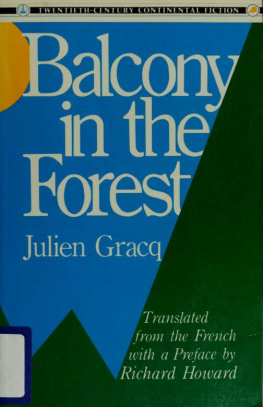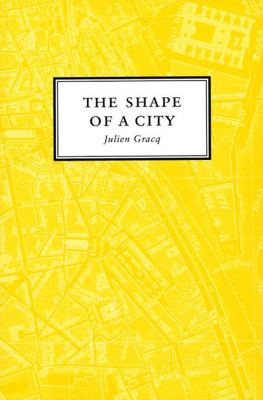Gracq - Balcony in the forest
Here you can read online Gracq - Balcony in the forest full text of the book (entire story) in english for free. Download pdf and epub, get meaning, cover and reviews about this ebook. year: 1987, publisher: New York : Columbia University Press, genre: Detective and thriller. Description of the work, (preface) as well as reviews are available. Best literature library LitArk.com created for fans of good reading and offers a wide selection of genres:
Romance novel
Science fiction
Adventure
Detective
Science
History
Home and family
Prose
Art
Politics
Computer
Non-fiction
Religion
Business
Children
Humor
Choose a favorite category and find really read worthwhile books. Enjoy immersion in the world of imagination, feel the emotions of the characters or learn something new for yourself, make an fascinating discovery.
- Book:Balcony in the forest
- Author:
- Publisher:New York : Columbia University Press
- Genre:
- Year:1987
- Rating:4 / 5
- Favourites:Add to favourites
- Your mark:
- 80
- 1
- 2
- 3
- 4
- 5
Balcony in the forest: summary, description and annotation
We offer to read an annotation, description, summary or preface (depends on what the author of the book "Balcony in the forest" wrote himself). If you haven't found the necessary information about the book — write in the comments, we will try to find it.
Balcony in the forest — read online for free the complete book (whole text) full work
Below is the text of the book, divided by pages. System saving the place of the last page read, allows you to conveniently read the book "Balcony in the forest" online for free, without having to search again every time where you left off. Put a bookmark, and you can go to the page where you finished reading at any time.
Font size:
Interval:
Bookmark:

This book made available by the Internet Archive.





Iranslators foreword to the morningside edition
N
lEITHER document nor testimony (Gracq's own experiences in World War II were on an entirely different front, and in altogether other circumstances), Balcony in the Forest, Gracq's fourth novel, and actually the precipitate of the encounter between a certain historical situation, one that was very unstable and indeed fugitive, and the inclination of the author's fantasy, is the only one of this author's fictionsamong so many legends, ro
Translator's Foreword to the Morningside Edition mances, gestes which can be presumed to be realistic. In the little forest outpost at the beginning of World War II, Lieutenant Grange has a passionate yet detached affair, during the fall and winter months, with Mona, a lovely child-widow whom he encounters in the forest much the way Golaud encounters Melisande. Then spring comes, and with it the murderous reality of the German avalanche. History, for an interval, becomes a kind of pure awaiting, in which Gracq is enabled to feel, for the first time, what he calls "imaginative communication with reality." All his other novels The Castle of Argol (1938), A Dark Stranger (1945), and The Opposing Shore (1951, translated in 1986)are so many myths of abeyance and interregnum in which the characters, or rather the figures (as we might say of any human silhouettes moving in darkness against a sanguinary light, within a singular silence) expunge each other's energies during a period of suspense, of transgressive daring, until the Unspeakable Event engulfs them in a longed-for yet deferred catastrophe. For this novelist has what might be called a Parsifal Complex (indeed, Balcony in the Forest opens with the adjuration by which Gurnemantz begins that music-drama: "Forest Guardians, guardians of sleep as wellwaken at least with the dawn!"), an imagination so structured that any action is merely the delusive interlude, the masque of
-VI
Translators Foreword to the Morningside Edition misapprehension, before a ravaging revelation. For Gracq, of couse, the Grail is indeed revealed as a cup of trembling, a ruinous chalicebut perhaps we never did put much credence in Wagner's stagey salvation. Hadn't Nietzsche warned us that with Amfortas, with Kundry, with Parsifal himself, we were only two steps away from the hospital? The astonishing thing about Gracq's novel, the last full-length fiction he was to write (in 1958, some eighteen years after the occurrences it is concerned to adumbrate), is that it has been able to transcribe in terms of contemporary life, of contemporary death, precisely those images and incidents which in all of Gracq's other works are assigned the distancing labels "gothic" or "surreal" or certainly "magical." Such a transformation has come about not because Gracq has changedfor he has not: no novelist ever remained so true to his esoteric inspirations as Monsieur Poirier, a geography professor who chooses to create his poems, his play, his essays, and his fictions, even his translation of Kleist's Penthisilea and his study of Andre Breton, under that mysterious, Breton-sounding pseudonym Gracq. But because reality changed.
In English we called it the "phony war." In France it was called, with varying degrees of validity, the drole de guerre. For nine months after the declaration of war between Germany and the Allies, hostilities
vii
Translator's Foreword to the Morningside Edition were suspended, were not engaged. And in that gestation, there was a great silence, a terrible holding of a continent's breath until the blow fell in the easy June of 1940, and France fell with it, as if there were no such fierce thing as combatonly surrender, only collapse, only defeat. But in the bated September of 1939 there was no knowing, no telling; the mobilized troops were sent to the various frontiersthose famous and "impregnable" lines that were to be so readily erasedwhere they waited in a demoralizing silence for month after month. This is the interval Gracq chose; it took him nearly two decades to write his way into it, to let reality speak in the terms of his somber enchantment. As he says: "Things were suspended, but there was no clearing, no perspective. It was not impossible (or so people thought) that things might end without hostilities. There might, then, be a 'white' peace. And there were also all kinds of catastrophic possibilities, including the one that came to pass. We found ourselves, truly, on the brink of a sort of mist-filled chasm, out of which it was very difficult to see what would emerge. It is, I think, quite an original situation, that of a declared war that does not get itself fought, that cannot begin."
Hence it is this novel of the phony war, of the inauthentic peace and the inactual hostilities, which is the least oneiric of Gracq's works. It is the least
-Vlll
Translator's Foreword to the Morningside Edition oneiric book because the period it treats was itself a kind of waking dream. The France of 1939/40 was living as if there had been no military necessity. "There was," Gracq observed in 1971, "the sentiment of a void, the sense of an enormous blank. Nothing occurred: there was an utterly somnambulistic aspect to everything. For everything continued as if nothing had happened. There was a paralysis, a putting-in-parenthesis, a preludeto what? No one knew. It was pure anticipation.' 1 The story of Lieutenant Grange (lieu-tenant, place-saving: even his rank is a kind of mystery, a holding action), assigned to command the isolated French blockhouse at Hautes Falizes, in the middle of the forestthe Forest of Arden!and, closer still, the Ardennes of the last Great War, near the Belgian border and the Meuse river. The story of Lieutenant Grange is nothing but the story of Anyman in a vacant moment whereof the true occurrences are the vast metamorphoses of nature (the turn of the seasons, the sullen erosion of rock to sand, the woodland murmurs of sprouting and decay), and the miniscule transformations within a single body ("... when he put his weight on his heel, a sharp spear of pain leaped up to his hips; against the harsh cloth that bound his skin, he felt the faint velvety shudder of fever, still almost voluptuous.").
It is of interest to note that this is Gracq's one
-IX
Translator's Foreword to the Morningside Edition novel to have been "made into" a movie, whereas The Opposing Shore, for example, has been produced as an opera: opera is of course the apposite "realization" for Gracq's work. Yet in the film of Balcony in the Forest, the author was amused to discover that the soldiers, the other soldiers, have much more continuous presence than in his book itself, though that presence has no effect on the process of the narrative. "Simply," as Gracq is pleased to say, "because in a scene in a novel, a character about whom the author has ceased to speak immediately becomes an absent presence, while in the film such a character remains caught in the camera fieldhe is still there. " Gracq was astonished to find the others dragged into the visual field, for in his text, his imaginative substance, there are never others unless they are named, unless they are audible as language. However capital the images, however striking the visions, Gracq is the purest of novelists, and there is a sense in which he cannot be reduced, transferred, or even translated into other versions, other forms of art.
Font size:
Interval:
Bookmark:
Similar books «Balcony in the forest»
Look at similar books to Balcony in the forest. We have selected literature similar in name and meaning in the hope of providing readers with more options to find new, interesting, not yet read works.
Discussion, reviews of the book Balcony in the forest and just readers' own opinions. Leave your comments, write what you think about the work, its meaning or the main characters. Specify what exactly you liked and what you didn't like, and why you think so.










